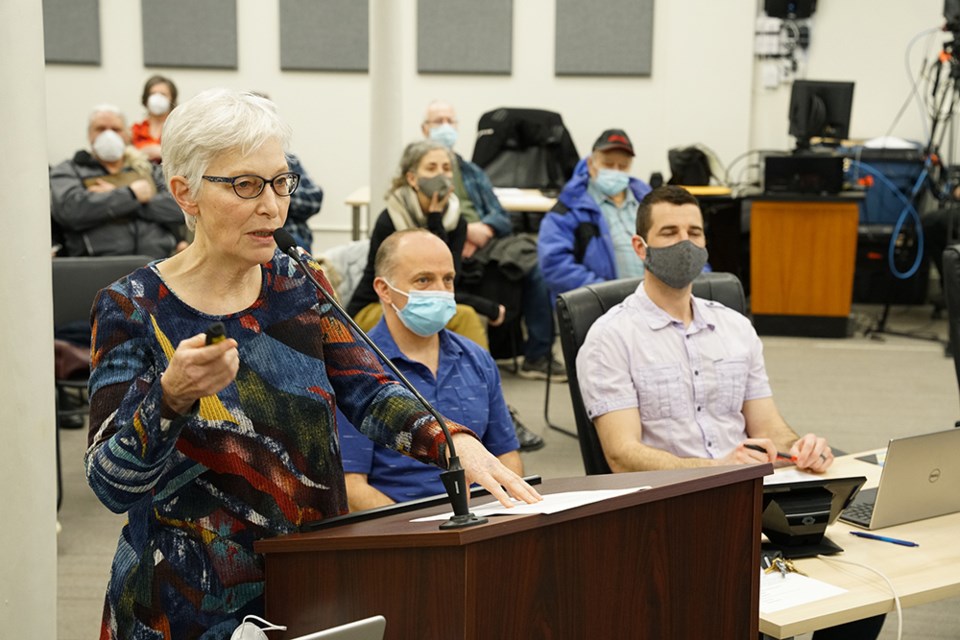City of Powell River councillors were provided a briefing about a group that has established advocating for direct economic benefits from local power generation.
Ellen Gould appeared before the city’s March 1 committee of the whole meeting, speaking on behalf of the newly formed Public Power for Powell River group.
“Our group is founded to advocate for local public benefits from the generation of electricity in our area,” said Gould. “We support the concept of energy democracy, the democratization of control over energy production and having it contribute to social equity.”
She said her personal knowledge of the electricity sector comes from working for a legal firm on a response to trade challenges against green energy subsidies.
“So, I do know something about the electricity sector and its intricacies; it’s a very complicated sector,” said Gould. “When I recently heard that Powell River Energy Inc. (PREI), a company ultimately owned by Brookfield Renewable Partners, was applying to be exempt from regulations, I thought ‘what can their argument be for that?’ That just seemed like an outrageous kind of ask.
“So, I read their submission, and there it was on page two, saying that the British Columbia Utilities Commission (BCUC) shouldn’t regulate Powell River Energy unless BCUC receives a complaint from a purchaser of power from PREI.”
Gould said since the company’s plans are to sell all of the power it generates to the United States, PREI is basically saying BCUC shouldn’t regulate them unless American customers aren’t happy.
“With that statement, Brookfield is declaring that neither local communities nor BC residents in general should have any interest in how these dams are run or who they sell power to,” said Gould. “We’ve come a long way since the dams in our region created thousands of local jobs and provided free electricity to local residents, which they used to do to Townsite. These original public benefits have somehow got sloughed off over the years.
“The fact remains that profits Brookfield makes from the Powell River and Lois Lake dams and sends to its international shareholders is totally reliant on publicly owned land, resources and transmission lines, some of which are subject to Tla’amin Nation treaty rights. In the Tla’amin submission to BCUC, they speak to the damage that the dam caused.”
She said Tla’amin ancestors were forced from their village, the river was dammed, and the salmon habitat was destroyed. She added that the salmon run was productive.
Gould said with the closure of the Catalyst Paper Tis’kwat mill, and PREI’s plans to sell all of its power to the US, Powell River is in the same situation as the people in the Kootenays were when dams were built on the Columbia River.
“With a lot of community organizing and courageous political leadership, their story had a happy ending,” said Gould. “The Columbia basin accord was established in 1995, returning 50 per cent of the profits from electricity sales to the Columbia basin trust. Last year, $71 million went from the trust back into the communities.”
Gould said it’s a model that could be followed in Powell River that could return so much to the community. She said her group strongly suggested that city council engage an expert so opportunities for public benefit can be seized at this critical time in Powell River’s history.
“We would also ask for a public consultation process on the future of the dams and the mill lands, as broad public support will be critical for a prosperous, equitable and environmentally sustainable future,” said Gould.
Mayor Dave Formosa said the city has received letters about establishing a trust similar to the Columbia basin accord. He said at a recent meeting between the city, Tla’amin and qathet Regional District, the item was put on the agenda.
“I was the chair of that meeting and where I ended up was basically suggesting to the three communities the possibility of such a trust – what did we three think about that?” said Formosa. “I left it with us all to think about it and have the three chief administrative officers meet and discuss this issue with their counterparts and report back.”
Formosa said as far as Brookfield goes, he hopes council’s strong opinion will be that when or if the mill site has a new owner, whoever purchases the site gets absolute first dibs on all of the power the dams produce, like the mill used to receive. He said his wish is that the new owner receives power at a favourable cost.
“We need that site to produce,” said Formosa, “and we need those folks to continue to remember why they are there.”




